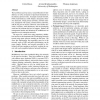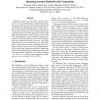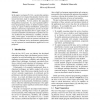HOTOS
2009
IEEE
15 years 6 months ago
2009
IEEE
116
click to vote
HOTOS
2009
IEEE
15 years 6 months ago
2009
IEEE
The last fifteen years has seen a vast proliferation of middleboxes to solve all manner of persistent limitations in the Internet protocol suite. Examples include firewalls, NATs,...
164
click to vote
HOTOS
2009
IEEE
15 years 6 months ago
2009
IEEE
Smartphones enable a new, rich user experience in pervasive computing, but their hardware is still very limited in terms of computation, memory, and energy reserves, thus limiting...
122
click to vote
HOTOS
2009
IEEE
15 years 6 months ago
2009
IEEE
Operating systems can efficiently provide system transactions to user applications, in which user-level processes can execute a series of system calls atomically and in isolation ...
102
click to vote
HOTOS
2009
IEEE
15 years 6 months ago
2009
IEEE
For over forty years, we have assumed hierarchical file system namespaces. These namespaces were a rudimentary attempt at simple organization. As users have begun to interact with...
114
click to vote
HOTOS
2009
IEEE
15 years 6 months ago
2009
IEEE
In this paper, we propose FLUXO, a system that separates an Internet service's logical functionality from the architectural decisions made to support performance, scalability...
114
Voted
HOTOS
2009
IEEE
15 years 6 months ago
2009
IEEE
Distributed systems are difficult to design and develop. The difficulties arise both in basic safety correctness properties, and in achieving high performance. As a result of this...
HOTOS
2009
IEEE
15 years 6 months ago
2009
IEEE
HOTOS
2009
IEEE
15 years 6 months ago
2009
IEEE
We introduce the new Wave model for exposing the temporal relationship among the queries in data-intensive distributed computing. The model defines the notion of query series to c...
111
click to vote
HOTOS
2009
IEEE
15 years 6 months ago
2009
IEEE
High performance on multicore processors requires that schedulers be reinvented. Traditional schedulers focus on keeping execution units busy by assigning each core a thread to ru...



